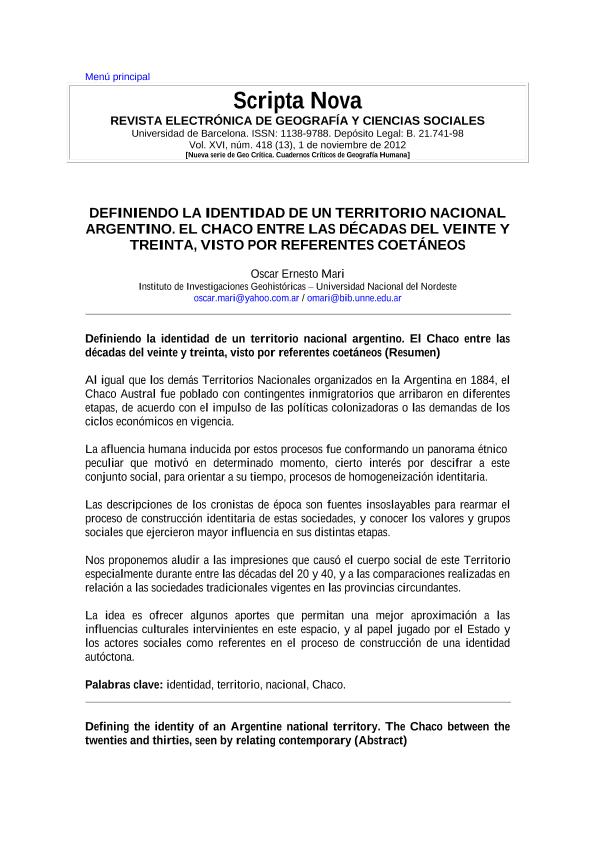Mostrar el registro sencillo del ítem
dc.contributor.author
Mari, Oscar Ernesto

dc.date.available
2017-05-26T15:21:00Z
dc.date.issued
2012-11
dc.identifier.citation
Mari, Oscar Ernesto; Definiendo la identidad de un territorio nacional argentino. El Chaco entre las décadas del veinte y treinta, visto por referentes coetáneos; Universidad de Barcelona; Scripta Nova; XVI; 418; 11-2012; 13-33
dc.identifier.issn
1138-9788
dc.identifier.uri
http://hdl.handle.net/11336/16958
dc.description.abstract
Al igual que los demás Territorios Nacionales organizados en la Argentina en 1884, el Chaco Austral fue poblado con contingentes inmigratorios que arribaron en diferentes etapas, de acuerdo con el impulso de las políticas colonizadoras o las demandas de los ciclos económicos en vigencia. La afluencia humana inducida por estos procesos fue conformando un panorama étnico peculiar que motivó en determinado momento, cierto interés por descifrar a este conjunto social, para orientar a su tiempo, procesos de homogeneización identitaria. Las descripciones de los cronistas de época son fuentes insoslayables para rearmar el proceso de construcción identitaria de estas sociedades, y conocer los valores y grupos sociales que ejercieron mayor influencia en sus distintas etapas. Nos proponemos aludir a las impresiones que causó el cuerpo social de este Territorio especialmente durante entre las décadas del 20 y 40, y a las comparaciones realizadas en relación a las sociedades tradicionales vigentes en las provincias circundantes. La idea es ofrecer algunos aportes que permitan una mejor aproximación a las influencias culturales intervinientes en este espacio, y al papel jugado por el Estado y los actores sociales como referentes en el proceso de construcción de una identidad autóctona.
dc.description.abstract
Like other national territories organized in Argentina in 1884, the Austral Chaco was populated with immigrant contingent that arrived at different stages, according to the impulse of colonial policies and the demands of the business cycle effect. The human influx induced by these processes was forming a distinctive ethnic panorama motivated at some point, some interest in deciphering the social whole, to guide his time, processes of homogenization of identity. The descriptions of the chroniclers of time are unavoidable sources to reset the process of identity construction of these companies, and know the values and social groups in heavily influencing its various stages. We propose to refer to impressions that caused the social body of the Territory especially during the decades between 20 and 40, and the comparisons made in relation to traditional societies existing in the surrounding provinces. The idea is to offer some novel contributions to enable a better approach to cultural influences involved in this space, and the role played by the state and social actors as references in the process of building a local identity.
dc.format
application/pdf
dc.language.iso
spa
dc.publisher
Universidad de Barcelona
dc.rights
info:eu-repo/semantics/openAccess
dc.rights.uri
https://creativecommons.org/licenses/by-nc-sa/2.5/ar/
dc.subject
Identidad
dc.subject
Territorio
dc.subject
Nacional
dc.subject
Chaco
dc.subject.classification
Otras Humanidades

dc.subject.classification
Otras Humanidades

dc.subject.classification
HUMANIDADES

dc.subject.classification
Otras Humanidades

dc.subject.classification
Otras Humanidades

dc.subject.classification
HUMANIDADES

dc.title
Definiendo la identidad de un territorio nacional argentino. El Chaco entre las décadas del veinte y treinta, visto por referentes coetáneos
dc.title
Defining the identity of an Argentine national territory. The Chaco between the twenties and thirties, seen by relating contemporary
dc.type
info:eu-repo/semantics/article
dc.type
info:ar-repo/semantics/artículo
dc.type
info:eu-repo/semantics/publishedVersion
dc.date.updated
2017-05-19T13:31:01Z
dc.journal.volume
XVI
dc.journal.number
418
dc.journal.pagination
13-33
dc.journal.pais
España

dc.journal.ciudad
Barcelona
dc.description.fil
Fil: Mari, Oscar Ernesto. Consejo Nacional de Investigaciones Científicas y Técnicas. Centro Científico Tecnológico Conicet - Nordeste. Instituto de Investigaciones Geohistoricas. Universidad Nacional del Nordeste. Instituto de Investigaciones Geohistoricas; Argentina
dc.journal.title
Scripta Nova

dc.relation.alternativeid
info:eu-repo/semantics/altIdentifier/url/http://www.ub.es/geocrit/sn/sn-418/sn-418-13.htm
Archivos asociados
